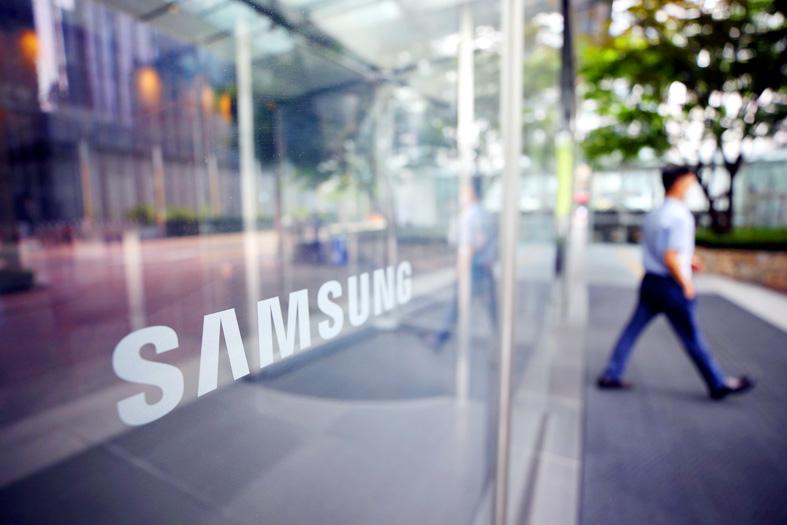Samsung Electronics Co’s net profit surged more than 70 percent in the second quarter thanks to higher memorychip prices fueled by demand spurred by the COVID-19 pandemic, the South Korean tech giant reported yesterday.
Pandemic-driven working from home boosted demand for devices and appliances powered by Samsung’s memory chips.
The company said that “memory shipments exceeded previous guidance and price increases were higher than expected.”

Photo: EPA-EFE
The world’s biggest smartphone maker saw net profit rise 73.4 percent year-on-year to 9.6 trillion won (US$8.38 billion) for April to June, the company said in a regulatory filing.
Operating profit increased 54.3 percent to 12.6 trillion won from 8.1 trillion won a year earlier, more than half of which came from the firm’s semiconductor business.
The strong results come despite a quarter-on-quarter decline in Samsung’s earnings from its smartphone business because of supply chain problems that disrupted global production.
“Samsung will benefit from memorychip prices that are likely to go higher in the third and fourth quarter,” Cape Investment & Securities analyst Park Sung-soon said.
The firm anticipates favorable market conditions for the rest of the year, with continued demand for memory chips in the server and mobile markets, but it warned that pandemic-fueled uncertainty would persist in the second half, citing “continued disruptions in component supply.”
Samsung is expected to showcase the latest foldable smartphone models of its Galaxy Z and clamshell Galaxy Z Flip next month. The upcoming gadgets would be equipped with “new multitasking capabilities and enhanced durability,” said T.M. Roh, head of Samsung’s mobile communications business.
Samsung aims to solidify its position in the smartphone market “with the rollout of its premium mobile lineups as well as cheaper models in the third quarter,” said James Kang, senior analyst at Euromonitor International.
The company could face headwinds next year, as consumer demand is likely to be weaker than this year, Kang said.
Samsung also faces legal challenges. Its leader, Jay Y. Lee, is on trial, charged with manipulating a takeover to smooth his succession at the top of Samsung Group.
Lee was separately jailed in January over a sprawling corruption scandal that brought down former South Korean president Park Geun-hye. He is eligible for parole next month after completing more than half of his two-and-a-half year jail term.
Meanwhile, LG Electronics Co, South Korea’s second-largest appliance firm after Samsung, posted a 65.5 percent jump in operating profit for the second quarter, to 1.1 trillion won.

GROWING OWINGS: While Luxembourg and China swapped the top three spots, the US continued to be the largest exposure for Taiwan for the 41st consecutive quarter The US remained the largest debtor nation to Taiwan’s banking sector for the 41st consecutive quarter at the end of September, after local banks’ exposure to the US market rose more than 2 percent from three months earlier, the central bank said. Exposure to the US increased to US$198.896 billion, up US$4.026 billion, or 2.07 percent, from US$194.87 billion in the previous quarter, data released by the central bank showed on Friday. Of the increase, about US$1.4 billion came from banks’ investments in securitized products and interbank loans in the US, while another US$2.6 billion stemmed from trust assets, including mutual funds,

Micron Memory Taiwan Co (台灣美光), a subsidiary of US memorychip maker Micron Technology Inc, has been granted a NT$4.7 billion (US$149.5 million) subsidy under the Ministry of Economic Affairs A+ Corporate Innovation and R&D Enhancement program, the ministry said yesterday. The US memorychip maker’s program aims to back the development of high-performance and high-bandwidth memory chips with a total budget of NT$11.75 billion, the ministry said. Aside from the government funding, Micron is to inject the remaining investment of NT$7.06 billion as the company applied to participate the government’s Global Innovation Partnership Program to deepen technology cooperation, a ministry official told the

Taiwan Semiconductor Manufacturing Co (TSMC, 台積電), the world’s leading advanced chipmaker, officially began volume production of its 2-nanometer chips in the fourth quarter of this year, according to a recent update on the company’s Web site. The low-key announcement confirms that TSMC, the go-to chipmaker for artificial intelligence (AI) hardware providers Nvidia Corp and iPhone maker Apple Inc, met its original roadmap for the next-generation technology. Production is currently centered at Fab 22 in Kaohsiung, utilizing the company’s first-generation nanosheet transistor technology. The new architecture achieves “full-node strides in performance and power consumption,” TSMC said. The company described the 2nm process as

Even as the US is embarked on a bitter rivalry with China over the deployment of artificial intelligence (AI), Chinese technology is quietly making inroads into the US market. Despite considerable geopolitical tensions, Chinese open-source AI models are winning over a growing number of programmers and companies in the US. These are different from the closed generative AI models that have become household names — ChatGPT-maker OpenAI or Google’s Gemini — whose inner workings are fiercely protected. In contrast, “open” models offered by many Chinese rivals, from Alibaba (阿里巴巴) to DeepSeek (深度求索), allow programmers to customize parts of the software to suit their